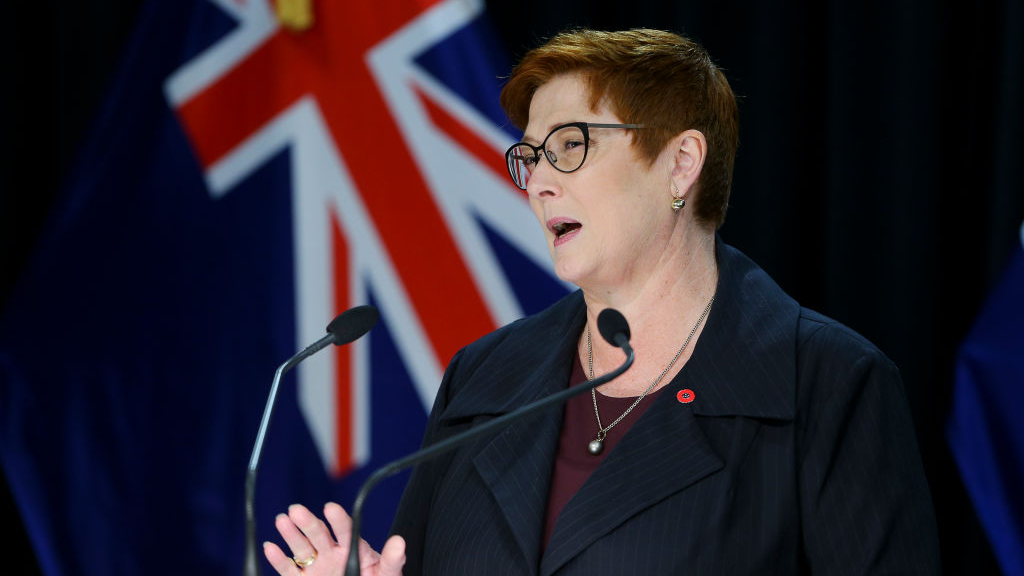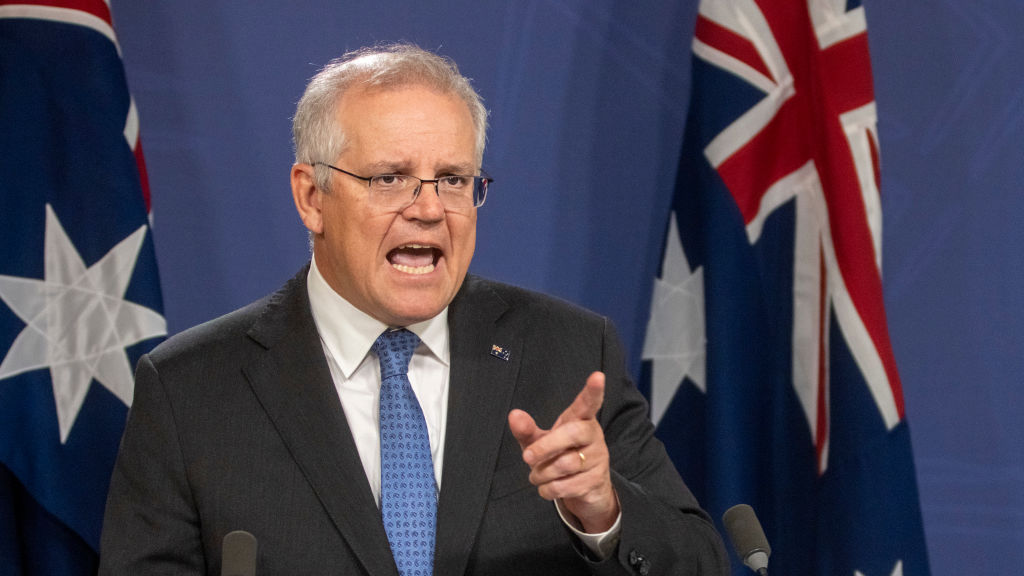
Australian Foreign Minister Marise Payne talks to the media at Parliament in Wellington, New Zealand, April 22, 2021. /Getty
Australian Foreign Minister Marise Payne talks to the media at Parliament in Wellington, New Zealand, April 22, 2021. /Getty
Editor's note: Hannan Hussain is a foreign affairs commentator and author. He is a Fulbright recipient at the University of Maryland, the U.S., and a former assistant researcher at Islamabad Policy Research Institute. The article reflects the author's opinions and not necessarily the views of CGTN.
In a manner of diplomatic antagonism that has come to dominate Australian foreign policy towards Beijing, Australian Foreign Minister Marise Payne on April 21 announced the cancellation of two Belt and Road Initiative (BRI) agreements signed between Victoria State and China. "I consider these … arrangements to be inconsistent with Australia's foreign policy or adverse to our foreign relations," alleged Payne.
But Canberra's failure to pinpoint so-called national security challenges under BRI, and its use of controversial veto power to sidestep Victoria's autonomy altogether, confirm the move as politically hostile. The 2018 memorandum signed between Victorian Premier Daniel Andrews and China's National Development and Reform Commission prepared the ground for Sino-Australia cooperation across the BRI infrastructure-building program. Similarly, the fact is that it paved the way for a subsequent framework to position intergovernmental working groups at the center of Sino-Australian cooperation.
None of these merits are part of Payne's cancellation rationale. Instead, capturing the roots of Australia's BRI prejudice is the new foreign veto scheme – an instrument billed by liberal press as some buffer against China's alleged "rogue state policies." It risks hitting Australian interests the hardest.
Consider December 2020, Australia's federal government significantly intensified its BRI resistance campaign at the time, targeting Victorian Premier Daniel Andrews' support for greater BRI engagement in the state of Victoria. A glaring example of the federal government's political targeting was the adoption of the "State and Territory Arrangements Act," a politically motivated legislation cited by Payne as the basis for her veto of Victoria's BRI engagement, ruling it as "inconsistent" or "adverse" for Australian foreign policy interests.
What Canberra refuses to mention as part of its vulnerabilities is that conventional exports and the Chinese investment footprint in select Australian states doubled and tripled during periods when broader BRI cooperation was a prospect unobstructed. Understand that such a leap in win-win development potential came with an olive branch for Australia to salvage its lost bilateral credibility: to better insulate camp politics from trade and economic interests, rework China sentiment away from a self-initiated trade war, and build on corridors of multilateralism through key templates of engagement – including Victoria's BRI agreements.
But Australia's current move, correctly declared by China as a recipe for "further damage to bilateral relations," plays to a gallery of ruling and opposition party hawks in parliament.

Australian Prime Minister Scott Morrison talks at a press conference in Sydney, Australia, April 19, 2021. /Getty
Australian Prime Minister Scott Morrison talks at a press conference in Sydney, Australia, April 19, 2021. /Getty
Consider Australian lawmakers' debt-trap propaganda on the BRI. "I've long said it was bad policy and bad optics, and it is a good thing that Australia and much of the free world has arrived at a shared understanding about this debt trap," alleged Foreign Affairs, Defense and Trade References Committee chairwoman Kimberley Kitching. The same belligerence could be spotted in the rhetoric of key members of opposition, some of which backed the BRI offensive to justify Australia's China "fallout," adding some fiction about diversifying Australia's trade and economy hereon.
Three likely consequences put that very line of argument on the ropes. First, Canberra's BRI U-turn will damage its ties with Beijing. Early signs reflect in China's conclusion that the Australian government operates with "no sincerity in improving China-Australia relations," and by punching above its weight, will only end up "hurting itself."
Second, unwarranted hostilities towards the BRI deprive Australia immediate stakes in any other mega connectivity initiative of the same caliber and growth, dashing hopes of "diversifying" its economy beyond trade dependence. Ironically, by some lawmakers' own admissions, it is Chinese engagement under the BRI that has raised the prospect of developing Australia's West Gate Tunnel, the Metro Tunnel, high-capacity trains – even when the agreements remained confined to a single Australian state. How is that for opportunity cost?
But above all, as Canberra's largest trading partner, Beijing has significant economic, trade and political levers to lift the wind off Australia's back if it may please, and show the costs of undercutting the BRI for cheap bipartisan conjecture.
Foreign Minister Payne is now rationalizing her BRI offensive as if delinked from "continuing engagement with China."
Let that be Beijing's call.
(If you want to contribute and have specific expertise, please contact us at opinions@cgtn.com.)

